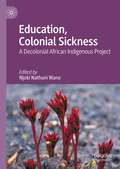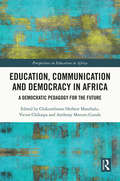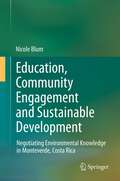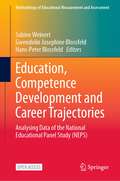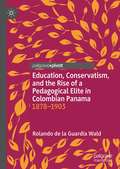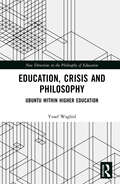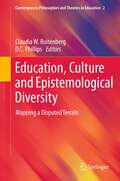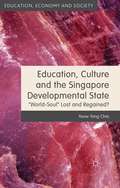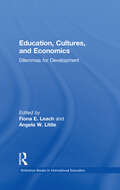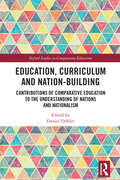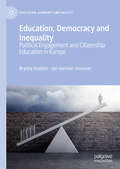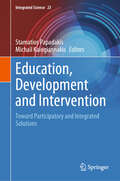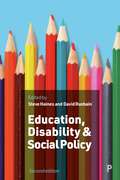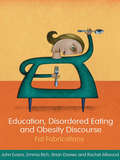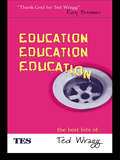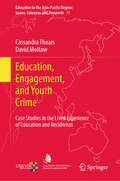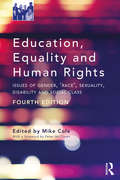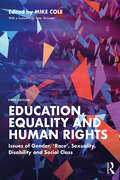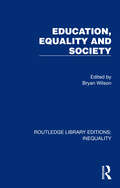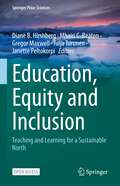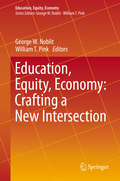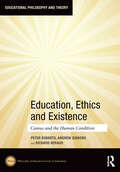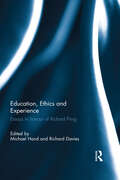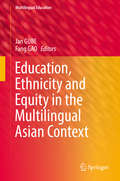- Table View
- List View
Education, Colonial Sickness: A Decolonial African Indigenous Project
by Njoki Nathani WaneIn the last two decades, we have witnessed the quest for decolonization; through research, writing, teaching, and curriculum across the globe. Calls to decolonize higher education have been overwhelming in recent year. However, the goal of decolonizing has evolved past not only the need to dismantle colonial empires but all imperial structures. Today, decolonization is deemed a basis for restorative justice under the lens of the psychological, economic, and cultural spectrum. In this book, the editor and her authors confront various dimensions of decolonizing work, structural, epistemic, personal, and relational, which are entangled and equally necessary. This book illuminates other sites and dimensions of decolonizing not only from Africa but also other areas. This convergence of critical scholarship, theoretical inquiry, and empirical research is committed to questioning and redressing inequality in contemporary history and other African studies. It signals one of many steps in a bid to consultatively examine how knowledge and power have been both defined and subsequently denied through the sphere of academic practice.
Education, Communication and Democracy in Africa: A Democratic Pedagogy for the Future (Perspectives on Education in Africa)
by Chikumbutso Herbert ManthaluThis innovative volume critically examines the intersection between democracy, education and communication in African educational domains. Providing a platform for multidisciplinary research, it advances scholarship in democratic citizenship education in African higher education through methodological and theoretical innovation. The book discusses the extent to which explicit or subtle communication frameworks that underlie policymaking, institutional culture, teaching and learning experiences in African higher education significantly engender democratic mind habits and practices in students as citizens. Chapters in the book examine how communication frameworks in pedagogy ought to navigate power imbalances between students on the one hand and the institution and academics on the other. The book also examines how (dis)empowering higher education policies are and whether they contribute to democratic equality. This book will be of great interest to academics, researchers and post-graduate students in the fields of education, democratic citizenship education, communication, and African studies.
Education, Community Engagement and Sustainable Development
by Nicole BlumA growing body of research has given critical attention to diverse theories and practices of environmental education, and its potential contribution to addressing pressing global issues such as sustainable development and climate change. While much of this work has focused on perspectives and practices in Europe and North America, this book explores environmental learning within formal education, in programmes by non-governmental organisations, and in public education spaces in Monteverde, Costa Rica. The discussion also highlights the need for more research to understand the broader social and economic interactions between such efforts and the communities in which they are located.
Education, Competence Development and Career Trajectories: Analysing Data of the National Educational Panel Study (NEPS) (Methodology of Educational Measurement and Assessment)
by Hans-Peter Blossfeld Sabine Weinert Gwendolin Josephine BlossfeldThis Open Access book presents the results of an interdisciplinary research program to utilize data from the multicohort German National Educational Panel Study (NEPS), which included over 100.000 participants in six nationally representative panel studies. Renowned researchers from the fields of sociology, psychology, educational science, economics, and survey methodology have used the (longitudinal) data for their substantive and/or methodological questions and present important results of their research projects. This edited volume contains contributions from the following four topics: (1) Competence Development: Individual Characteristics, Learning Environments, and other Contextual Factors, (2) Educational Transitions and Pathways: Influencing Factors and Outcomes, (3) Vocational Training and Labour Market, and (4) Individuals with Migration Background. It provides essential insights for researchers, postdocs, PhD students, and university students of different scientific disciplines interested in educational sciences as well as for policy makers who have to deal with educational problems in modern societies.
Education, Conservatism, and the Rise of a Pedagogical Elite in Colombian Panama: 1878-1903
by Rolando de la Guardia WaldThis book historically reconstructs the conservative and moderate liberals’ views on governance, morality, and education within the context of La Regeneración (1878-1903) in Colombian Panama. de la Guardia Wald explores the way political theories and ideologies, especially conservatism and positivism, shaped late nineteenth-century Panamanian pedagogues’ conceptualizations of proper education for the sake of social regeneration. By demonstrating that Isthmian political and pedagogical debates went beyond the preoccupation for the realisation of classic liberalism and exploitation of Panama’s geographical views, this book challenges the perspective that Panamanian identity was a fabrication of the United States. Instead, this study reveals that the combination of positivist and conservative understandings of morality, reason, and good science defined governmental policies intended to recuperate and enhance civic values and nationalism, leading the way to progress and modernity.
Education, Creativity, and Economic Empowerment in Africa
by Toyin Falola Jamaine AbidogunEducation and the arts offer multiple, mutually clarifying lenses through which to examine and understand issues of poverty and empowerment. Here, both are combined in a fascinating look at how these two often overlooked elements promote social equality and cultivate personal agency across Africa's diverse political-economic landscapes.
Education, Crisis and Philosophy: Ubuntu within Higher Education (New Directions in the Philosophy of Education)
by Yusef WaghidThis book brings together a discussion of educational philosophy, nihilism and humanity to rethink education in times of crisis, with a particular focus on teaching and learning in universities. The book argues that an educational crisis manifests when the value of academic institutions come under attack, looking closely at how higher education practices have been devalued. The book is situated in the context of three intertwined crises; the coronavirus pandemic, economic decline resulting in poverty and unemployment, and the crisis of human migration. It questions what the role of education is, or ought to be, in times of crisis and how our humanity ought to be cultivated during such turbulent times. This novel and timely text will be of great interest to researchers, academics and postgraduate students in the fields of educational philosophy, higher education and international education.
Education, Culture and Epistemological Diversity
by Claudia W. Ruitenberg D. C. PhillipsIn the recent educational research literature, it has been asserted that ethnic or cultural groups have their own distinctive epistemologies, and that these have been given short shrift by the dominant social group. Educational research, then, is pursued within a framework that embodies assumptions about knowledge and knowledge production that reflect the interests and historical traditions of this dominant group. In such arguments, however, some relevant philosophical issues remain unresolved, such as what claims about culturally distinctive epistemologies mean, precisely, and how they relate to traditional epistemological distinctions between beliefs and knowledge. Furthermore, can these ways of establishing knowledge stand up to critical scrutiny? This volume marshals a variety of resources to pursue such open questions in a lively and accessible way: a critical literature review, analyses from philosophers of education who have different positions on the key issues, a roundtable discussion, and interactions between the two editors, who sometimes disagree. It also employs the work of prominent feminist epistemologists who have investigated parallel issues with sophistication. This volume does not settle the question of culturally distinctive epistemologies, but teases out the various philosophical, sociological and political aspects of the issue so that the debate can continue with greater clarity.
Education, Culture and the Singapore Developmental State
by Yeow-Tong ChiaThis book explores the role of education in the formation of the Singapore developmental state. The book provides a historical study of citizenship education in Singapore, whereby a comparative study of history, civics and social studies curricula, and the politics and policies that underpin them are examined.
Education, Cultures, and Economics: Dilemmas for Development (Reference Books in International Education #48)
by Angela W. Little Fiona E. LeachThis edited volume reviews the conflict between economic prescriptions for improved education in the developing world and local cultures. Among the issues reviewed are: conceptions of culture and economics in development and education literature, economic considerations of school systems to promote cultural goals, the differentiation of schools from other sites of cultural reproduction, learning experiences of various cultural groups, and the cross-cultural work of development agencies.
Education, Curriculum and Nation-Building: Contributions of Comparative Education to the Understanding of Nations and Nationalism (Oxford Studies in Comparative Education)
by Daniel TröhlerContributing to interdisciplinary discussions on nationalism, the book explores how educational systems and practices contribute to the phenomena of nationalism and nation-building. Using nine comparative case studies from four continents, the book elaborates a theoretical understanding of nationalism from the perspectives of comparative education research. It integrates the theme of nation, nation-building and nationalism and its involvement with issues of education. It explores the theoretical scope of concepts such as national identities, national literacies, or "doing" nation. The book revives the idea that nation should be the starting point of comparative research and contributes to the theoretically reflective integration of nationalism research into education research. This timely book will be highly relevant for researchers, academics, and postgraduate students in the fields of comparative education, international education, education policy, and curriculum studies.
Education, Democracy and Inequality: Political Engagement and Citizenship Education in Europe (Education, Economy and Society)
by Jan Germen Janmaat Bryony HoskinsThis book posits that national education systems are enhancing socioeconomic inequalities in political engagement. While the democratic ideal is social equality in political engagement, the authors demonstrate that the English education system is recreating and enhancing entrenched democratic inequalities. In Europe, the UK has the strongest correlation between social background and voting behaviours. Examining the role of the school and the education system in the potential reproduction of these inequalities, the authors draw upon the theories of Bourdieu and Bernstein and compare the English school system to other European countries to analyse barriers that are put along the way to political engagement. In times of political disaffection, frustration and polarisation, it is particularly important to uncover why young people from disadvantaged backgrounds are less likely to engage politically, and to help inspire future generations to use their voice. This timely book will be of interest and value to students and scholars of educational inequality and political engagement.
Education, Development and Intervention: Toward Participatory and Integrated Solutions (Integrated Science #23)
by Stamatios Papadakis Michail KalogiannakisThis book explores integrated education and learning, with a focus on new approaches such as artificial intelligence and ChatGPT. It provides insight into educational techniques that promote critical thinking and enhance learning skills. It covers various mechanisms that influence this link, including meta-cognitive capacity, memory, cognitive style, conceptual approaches, digitization, teaching approaches, echoing, and questioning. This discussion spans all levels, from early childhood to higher education. Additionally, it provides pedagogical tips on creating a learning environment that encourages pupils' creativity and critical thinking, both online and in the classroom. It demonstrates how an integrated approach to education can create high-quality minds and promote modern values to meet current and future challenges. Undergraduate and postgraduate students, early childhood teachers and educators, as well as academic faculty can benefit from its contents as it presents valuable perspectives, both practical and theoretical, that enrich the current STEM, robotics, and mobile apps education agenda.
Education, Disability and Social Policy
by Steve Haines and David RuebainEducational opportunities for disabled children remain a vital contemporary issue in British social policy. This new edition of the milestone book Education, Disability and Social Policy outlines critical debates in education concerning the position and experiences of disabled children and young people within a contemporary policy context. Incorporating new voices from leading thinkers, this second edition includes a fresh introduction and updates to key chapters, including whether the Children and Families Act (2014) resolved tensions between parents and local authorities over resources, and proposals for a whole-school, strengths-based approach to social, emotional and mental health difficulties. In addition, it includes a new discussion on the intersection of race and disability.
Education, Disordered Eating and Obesity Discourse: Fat Fabrications
by Brian Davies John Evans Emma Rich Rachel AllwoodEating less, exercising more and losing weight seem the obvious solution for the oncoming 'obesity epidemic'. Rarely, however, is thought given to how these messages are interpreted and whether they are in fact inherently healthy. Education, Disordered Eating and Obesity Discourse investigates how 'body centred talk' about weight, fat, food and exercise is recycled in schools, enters educational processes, and impacts on the identities and health of young people. Drawing on the experiences of young women who have developed eating disorders and research on international school curricula and the media, the authors challenge the veracity, substance and merits of contemporary 'obesity discourse'. By concentrating on previously unexplored aspects of the debate around weight and health, it is revealed how well-meaning advice can propel some children toward behaviour that seriously damages their health. This book is not only about 'eating disorders' and the people affected, but the effects of obesity discourse on everyone’s health as it enters public policy, educational practice and the cultural fabric of our lives. It will interest students, teachers, doctors, health professionals and researchers concerned with obesity and weight issues.
Education, Education, Education: The Best Bits of Ted Wragg
by E. C. WraggWhen New Labour came into office in 1997, its commitment to 'education, education, education' captured the imagination of the public. This collection of humorous articles by Ted Wragg between 1998 to 2003 exposes the real state of education during this period, when educational policy was never far from the headlines. No one escapes Ted's sharp-shooting wit: from the 'blamers and shamers' who try to turn teacher-bashing into a national pastime to the 'pale policy wonks' in the Department of Education, who issue regular hare-brained initiatives from the mysterious 'Tony Zoffis'. Split into seven issue-focused chapters, this hilarious collection will be a tonic for anyone finding themselves unsure whether to laugh or cry about recent developments in the world of education.
Education, Engagement, and Youth Crime: Case Studies in the Lived Experience of Education and Recidivism (Education in the Asia-Pacific Region: Issues, Concerns and Prospects #71)
by Cassandra Thoars David MoltowThis book presents insights into how affective educational experiences may be associated with youth criminal behaviour and the pathway to recidivism. It explores the perspectives and lived school experiences of five young adult male prison inmates, including while they were incarcerated as youths. Through these case studies, the book explores the relationship between affective engagement in education and recidivism.This book shows that participants were affectively disengaged from education prior to their initial incarceration in a youth detention facility, and that their disaffection before, during, and after youth incarceration both generated and impacted on their cognitive and behavioural disengagement from education. Moreover, a range of additional factors not directly causally related to their schooling were shown to have had a significant effect on their engagement in education. The book considers a number of key findings. First, the foundational role that a sense of belonging plays in how young people experience education and its relation to crime. Second, the importance of individualized transition plans for youth at risk, and youth offenders before, during, and after incarceration. Third, the extent to which successful transition from youth offending and recidivism hinges on interagency collaboration. This book will be beneficial to teacher educators, education researchers, criminologists and sociologists.
Education, Equality and Human Rights: Issues of Gender, 'Race', Sexuality, Disability and Social Class
by Mike ColeThe fourth edition of Education, Equality and Human Rights has been fully updated to reflect the economic, political, social and cultural changes in educational and political policy and practice, as austerity continues and in the light of the EU referendum. Written by a carefully selected group of experts, each of the five equality issues of gender, ‘race’, sexuality, disability and social class are covered as areas in their own right as well as in relation to education. Key issues explored include: human rights, equality and education women and equality, historically and now gender and education perspectives throughout time racism in the UK from the Empire to the present racism and education from imperial times to the May government the making and remaking of sexualities the challenges surrounding teaching and learning about sexuality in schools the struggle for disability equality inclusive education social class, Marxism and socialism social class inequality and education. With an uncompromising and rigorous analysis of education and human rights and a foreword from Professor Peter McClaren, Education, Equality and Human Rights is an essential resource across a wide range of disciplines and for all those interested in education, social policy and human rights.
Education, Equality and Human Rights: Issues of Gender, 'Race', Sexuality, Disability and Social Class
by Mike ColeThe fifth edition of the market-leading Education, Equality and Human Rights has been fully updated to reflect economic, political and cultural changes in the UK, including the impacts of Brexit and Covid-19. It considers the great changes we are witnessing in recent years, such as climate change emergency, pandemics, the Fourth Industrial Revolution and their interrelationships. Written by world experts in their respective fields, each of the five equality issues of gender, race, sexuality, disability and social class is covered in their own right as well as in relation to education. Key issues explored include: • human rights, equality and education • women and equality—historically and now • gender, education and social change • race and racism through history and today • racism and education from Empire to Johnson • sexualities, identities and equality • challenges in teaching and learning about sexuality and homo- and trans-phobia in schools • disability equality as the last Civil Right? • developing inclusive education and governments’ resistance • social class, neoliberal capitalism and the Marxist alternative • selective schooling, mystifying social class, neoliberalism and alternatives With an uncompromising and rigorous analysis of equality issues and a foreword from Peter McLaren addressing challenges to democracy in the US, this new edition of Education, Equality and Human Rights is an essential and contemporary resource across a wide range of disciplines and for all those interested in education, social policy and human rights.
Education, Equality and Society (Routledge Library Editions: Inequality #11)
by Bryan WilsonOriginally published in 1975, the essays in this book explore a particular level at which the concept of equality must be applied if educational equality is to be realised. Whilst each stands independently of the others, there are points of convergence and overlap in the perspectives of the writers, each of whom represents a different discipline: education, sociology, psychology, philosophy and politics. The relationship between equality and unity, uniformity and justice are discussed, and at every level false assumptions are revealed.
Education, Equity and Inclusion: Teaching and Learning for a Sustainable North (Springer Polar Sciences)
by Mhairi C. Beaton Diane B. Hirshberg Gregor Maxwell Tuija Turunen Janette PeltokorpiThis open access book provides a current view on education, equity and inclusion within the lens of education for a sustainable North. The first book published by the University of the Arctic Thematic Network for Teacher Education for Social Justice and Diversity (Including the North: A comparative study of the policies on inclusion and equity in the circumpolar North, 2019) highlighted policies of inclusion and equity in education in national and regional contexts. This new book explores in more depth the provision of education across the north, focusing on challenges and innovations in meeting the needs of diverse learners in remote and rapidly changing contexts.While many texts address issues of equity, inclusion and diversity, they are almost all focused on the global South, and miss the lessons that can be learned from Northern regions. This book offers an extended essay on teaching and learning through various perspectives and experiences with the aim of creating a more sustainable North. It is structured around two main themes: 1) Supporting Teachers for Diversity and Inclusion in the Classroom including consideration of language and identity issues, 2) Engendering community solutions to structural and geographical challenges in education in the circumpolar north.
Education, Equity, Economy: Crafting a New Intersection
by George W. Noblit William T. PinkThis volume will introduce the readers to an alternative nexus of education, equity and economy, pointing to economies and educations that promote a less stratified and exploitive world, and as the chapter authors demonstrate, this view has a wide range of applications, from technology, mathematics, to environmental catastrophes and indigenous cultures. This first volume in the new book series not only introduces the series itself, but also several authors whose chapters that appear here presage the in-depth analysis that will be offered by their volumes in the series. Education is invoked repeatedly in the 'class warfare' that pits the population against the elites as the investment that makes the difference, in terms of both policy and individual commitment, in the economy. The economy in this scenario is competitive, accumulative, exploitive and stratifying, implying education should mirror this and prepare people to fit this economy. However, education has other historic goals of developing common cultures, national identities, and civic engagement that belie this form of economic determinism. This volume and the series will explore this new nexus of economy and education with equity.
Education, Ethics and Existence: Camus and the Human Condition (ISSN)
by Peter Roberts Andrew Gibbons Richard HeraudBest known today for his novels, plays and short stories, but also an accomplished essayist, editor and journalist, Albert Camus was one of the most influential literary figures of the 20th century. He has gained widespread recognition for works such as The Stranger, Caligula, The Plague and Exile and the Kingdom. In 1957 Camus was awarded the Nobel Prize for Literature. In 1960 he was killed in a car accident, aged just 46. Since Camus’ untimely death, his work has been engaged by scholars in literature, politics, philosophy and many other fields. This volume is one of the first book-length studies of Camus with a specifically educational focus. Camus’ writings raise and address ethical and political questions that resonate strongly with current concerns and debates in educational theory, and the difficulties and dilemmas faced by his characters mirror those encountered by many teachers in school classrooms. This book will appeal to all who wish to consider the connections between education, ethics and the problem of human existence.This book was originally published as a special issue of Educational Philosophy & Theory.
Education, Ethics and Experience: Essays in honour of Richard Pring
by Richard Davies Michael HandEducation, Ethics and Experience is a collection of original philosophical essays celebrating the work of one of the most influential philosophers of education of the last 40 years. Richard Pring’s substantial body of work has addressed topics ranging from curriculum integration to the comprehensive ideal, vocational education to faith schools, professional development to the privatisation of education, moral seriousness to the nature of educational research. The twelve essays collected here explore and build on Pring’s treatment of topics that are central to the field of philosophy of education and high on the agenda of education policy-makers. The essays are by no means uncritical: some authors disagree sharply with Pring; others see his arguments as useful but incomplete, in need of addition or amendment. But all acknowledge their intellectual debt to him and recognise him as a giant on whose shoulders they stand. This book will be a welcome and lively read for educational academics, researchers and students of Educational Studies and Philosophy.
Education, Ethnicity and Equity in the Multilingual Asian Context (Multilingual Education #32)
by Jan Gube Fang GaoThe book addresses issues related to the education of ethnic minority individuals in the multilingual Asian region. It features recent research and practices of scholars aiming to rethink educational policy and practice surrounding the education of ethnic minority students with a variety of language scenarios in Hong Kong and other Asian contexts. It documents how ethnicity and inequality are played out at policy, school, and individual levels, and how these affect the education of ethnic minorities in their host societies. Using a range of methods, from surveys to interviews and document analysis, this book describes the links between language, identity and educational inequality related to ethnic minorities in Asian contexts.
